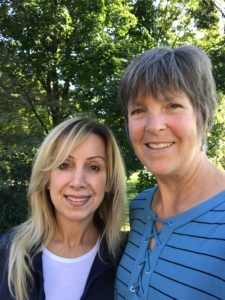
Lillian Faranso and Stacey Peper
Michigan resident Stacey Peper knows what it’s like to struggle to become fluent in English as an adult. “I had been out of the country for 28 years, I was living in Europe, speaking mostly German. As the years went on, I was having trouble sounding out words in English again,” Stacey recalls.
After moving back to the US, Stacey became involved with a local tutoring organization, Oakland Literacy Council. About three years ago, Stacey was paired with Lillian Faranso.
“I’m from Iraq. I got married in my early 20s and had kids and I never had time to speak English,” Lillian tells The Journal.
After emigrating from Baghdad at 15 and with her children now adults, Lillian decided it was her time to tackle English. “My daughter found the listing for Oakland Literacy Council and said, ‘Mom, I found the right school for you!'”
Not that it was easy for Lillian or Stacey to find each other: Lillian’s first tutor dropped out after only a few lessons, leaving her frustrated. But once they were paired together, Stacey and Lillian set to work. And while Lillian made some gains with speaking, after three years of working together, Stacey worried that her student just wasn’t progressing with reading and writing.
While searching the internet for methods to help improve Lillian’s grasp on letter sounds and word construction, Stacey found IMSE. And in August 2015, Stacey took the IMSE Comprehensive Orton-Gillingham 30-hour training. “I was a little overwhelmed [with the comprehensive training], to be honest. I’m not an educator in the traditional sense,” Stacey says.
“I want to keep going and learn all that I can. A lot of people say, ‘But we’re too old, we’re forty, fifty.’ I say everyone should try.” —Lillian Faranso
After finishing the 30-hour training, Stacey knew she wanted to put her new skills to the test with Lillian: “Immediately I knew I wanted to do the practicum.” Over the course of 45 lessons, Stacey worked with IMSE trainer Helen Brandon. Helen would review the lessons Stacey filmed with Lillian and offer advice and tips for improvement.
“I knew that it was going to be difficult at first, but felt that Lillian and Stacey were ready for the challenge! As a teacher, Stacey was very eager to learn and would always apply the feedback recommendations I gave her. I was amazed very early on at Lillian’s motivation. Every little task or big task Lillian accomplished she reacted the same way……..EXCITED!” Helen tells The Journal.
“We can sometimes forget that everyone can benefit from multi-sensory learning…the multi-sensory aspect of the lessons will help engage the learner and make the lessons more motivating and meaningful.” —Helen Brandon, IMSE trainer
Working with adult ESL learners is a different experience from working with children, of course. But Stacey embraced the challenges. “Lillian was not only struggling with the encoding and decoding skills of the English language, but also the comprehension of simple words in our language because of her cultural and language differences. Stacey was excellent at pulling together reading resources for Lillian to practice that were meaningful for both an adult and an ESL learner,” Helen says.
For Lillian, IMSE’s structured and explicit approach helped her unlock vowels—something she had long struggled with.
The other component that resonated with Lillian was the multi-sensory nature of the lessons. Stacey believes the multi-sensory aspect of their lessons helped Lillian better retain the information she was taking in. “Listening, seeing letters on the cards and then writing on sand…all of that has been helpful for Lillian,” Stacey says. As a tutor, Stacey likes the structured framework IMSE offers. “For me it’s helpful, as I know what I need to be doing, lesson to lesson.”
“We can sometimes forget that everyone can benefit from multi-sensory learning,” Helen Brandon says. “While it is definitely easier with our younger learners to sing a song or create an art project, we need to remember that doing something multi-sensory with our older students is essential, as well, to their long-term mastery of a concept. Also, the multi-sensory aspect of the lessons will help engage the learner and make the lessons more motivating and meaningful.”
IMSE’s systematic lesson plans and multiple means of lesson reinforcement helped Lillian conquer an element of English with which she had long struggled: vowels. “I never knew how to hear the vowels. And then blending them was a problem for me. Like the word /and/, now I can hear the three sounds of /a/, /n/, /d/,” Lillian tells The Journal.
Looking ahead, Lillian plans to continue her work, learning to read and write English fluently with Stacey. “I want to keep going and learn all that I can,” Lillian says. “A lot of people say, ‘but we’re too old, we’re forty, fifty.’ I say everyone should try.”
For more on OG and adult learners, check out another story in this series: https://journal.orton-gillingham.com/profiles-in-teaching-janet-and-wayne/
